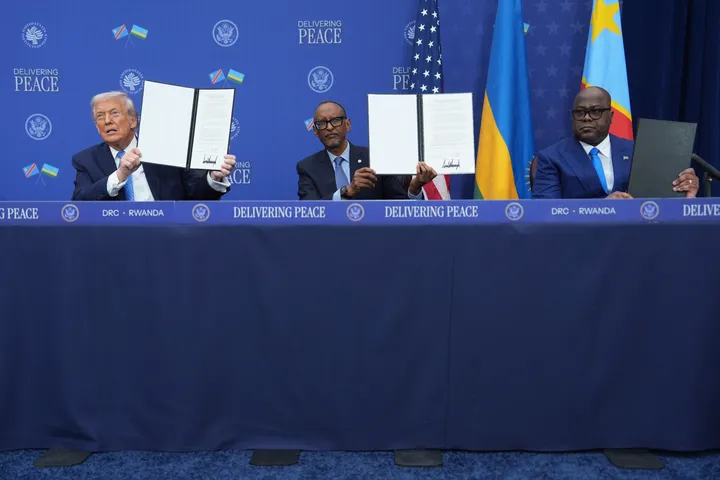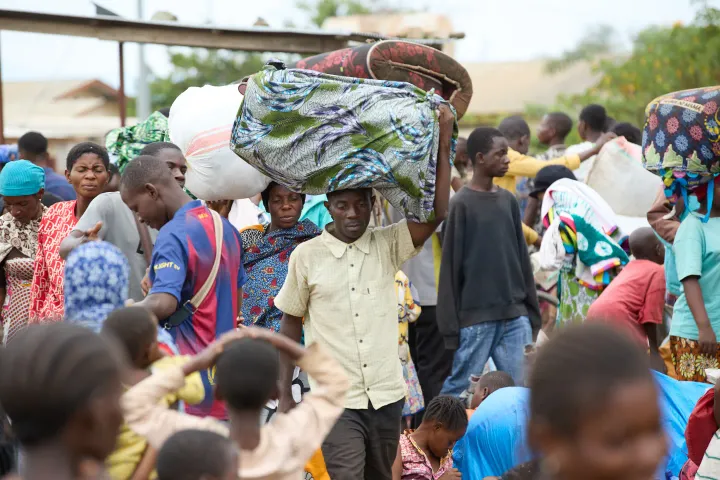By Sylvia Chebet
Heaps of carcasses lie strewn all over the place, appearing to stir occasionally as a strong breeze combs through the tufts of feathers sticking to rotting flesh. In the animal kingdom, this vivid imagery of death would invite a hiss of delight from nature's ultimate scavenger. Except that these are carcasses of the very vultures that would otherwise feast on them.
This is what happened in Guinea-Bissau in 2020, when over 2,000 vultures were poisoned; in Botswana in 2019, when 537 were killed; and in Namibia in 2013, when over 400 died after feasting on a poisoned carcass.
Conservationists lament that Africa is fast losing its vultures. They have been dying by the thousands, going on a steep slide towards potential extinction. A report by BirdLife International states that of the 11 species found in the continent, seven are at risk of extinction, and four are critically endangered.
"The White-backed vulture, which is the commonest in Africa, has shown a decline of up to 90%. In other species such as the Egyptian and Hooded vultures, we have seen up to 92% declines,” Fadzai Matsvimbo, coordinator of BirdLife International’s Preventing of Extinction Programme, told TRT Afrika.
Conservation challenges
Poisoning and poaching pose the biggest threat to Africa's vultures. Being the most efficient scavengers, they suffer the worst losses, in some cases dropping dead from trees or mid-flight within metres of a poisoned carcass. Usually, they are either intended or accidental victims.
A committee of vultures circling a carcass can be seen from miles away; so, poachers often poison them to avoid drawing the attention of rangers and wardens. Between 2012 and 2014, 2,044 poaching-related vulture deaths occurred in seven African countries, according to Oryx – The International Journal of Conservation.
The birds are also the unintended victims of livestock farmers poisoning predators like lions that threaten their livestock.
Demand for vulture parts for traditional medicine and superstition is one of the major factors driving vultures into extinction. Conservationists attribute 29% of African vulture deaths to belief-based use.
Considered clairvoyant, their heads and brains are reportedly the most prized parts, with gamblers relying on them to bet. Students are also said to depend on them to pass exams, and traditional healers supposedly commune with their ancestors using vulture parts, besides prescribing them as medicine for certain ailments.
Following the Guinea-Bissau poisoning incident in 2020, investigators discovered that traders were selling vulture parts hidden in the horns of other animals. They found out that heads were being sold for approximately US $25 and feet for about $17.
The declining vulture population is also attributed to other factors such as loss of habitat, electrocution, collision with wind turbines, and power lines. Between 1996 and 2016, more than 1,261 birds were killed in 517 incidents involving power lines in South Africa alone, according to statistics gathered by the Endangered Wildlife Trust.
Clean-up crew
Vultures form an integral part in cleaning up the environment and are at the heart of prevention of the spread of disease. Unlike what's thought of scavengers, they help to keep the earth clean. Conservationists say after feeding, they tend to find a pool to bath or clean up. When they swoop in for a gory feast on the dead, they not only clear carcasses that would be breeding grounds for bacteria, but also protect other wildlife from contagious diseases.
Their stomach acid is said to be among the most corrosive in the animal kingdom and kills pathogens. Vultures can eat meat contaminated with diseases like anthrax, cholera and rabies without getting sick, but also stop their spread. When other animals, like dogs, cats, or rats, scavenge, they become carriers of any disease the carcass may have had, that is if they survive.
The sharp decline of vulture numbers, however, is a concern that is unravelling quietly, with many people unaware or unbothered. Scientists are warning that ignoring the vulture crisis risks the very ecosystem in which human beings live too. Matsvimbo from BirdLife International reckons that our health depends on the role these birds play that have been aptly described as "earth's clean-up crew".
"Imagine, if you don’t empty the garbage or trash in your house. If you live in a city, imagine if authorities fail to collect household refuse on time, what would happen? We would have a lot of diseases and awful smells around us. Vultures are doing the same job for free. These birds are just flying up and down, quietly removing carcasses, and protecting us from potential disease explosions. What’s not to love about them?" she poses.
Should the vultures vanish from the scene, there would be a dramatic increase of diseases as it happened in India in the 1990s when nearly 99% of the birds were wiped out.
"What happened is that they were using diclofenac to treat cows and what they didn’t understand is that it was impacting vultures that fed on the dead cows. A lot of vultures died. What the vultures were no longer in the equation, feral dogs’ population boomed because now there was a lot of food for them. Subsequently, there was an explosion of rabies,” Matsvimbo explains.
At the time, she adds, nobody had made the connection between rabies and the absence of the vultures. When that was established, India had to pump in money to re-introduce vultures while containing the rabies outbreak.
With many pressing needs, Matsvimbo observes that restoration of vulture populations may never get to the priority list for governments.
"Imagine the cost, taking out a few billions to fix a problem that we could have avoided may not be feasible in the African continent considering the funding we need to tackle other problems. Certainly, the best way is to make sure we don’t lose the vultures," she says.
Vultures can live for 30 years, but they mature late and are slow breeders. Conservationists say a pair only raises one chick every two years. The slow reproduction rate against the multitude of threats, means critically endangered species may not survive in an increasingly intolerant landscape.
But there is a glimmer of hope in efforts to ensure the vultures carry on their scavenging duties without harm.
“We have established more than a million hectares of vulture safe zones in Southern Africa – Zambia, Zimbabwe and South Africa,” says Matsvimbo. "Vulture support groups established in Zimbabwe have been effective in reducing poisoning incidences. The organisation is also working with traditional healers in West, South and East Africa to tackle illegal trade in vulture parts."
























